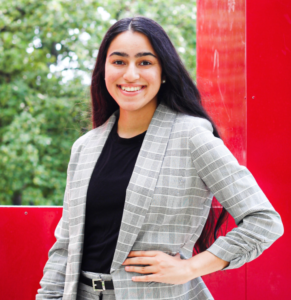In an effort to increase menstrual equity on campus, the Associated Students of the University of Utah (ASUU) has partnered with University Facilities to permanently supply free menstrual products in all student academic buildings. These products can be found in all men’s, women’s and gender-neutral restrooms.
The University of Utah will be the first public university in the state of Utah to have access to free menstrual products in all bathrooms for students, staff and faculty, demonstrating the university’s leadership in the state. Members of the campus community will see these bins and products in bathrooms by July 1. For more information about the project, visit the ASUU website.
 ASUU Senator Muskan Walia, a second-year student, had learned that ASUU student leaders had been interested in seeing a similar initiative/commitment from the university, but the project had been fraught with obstacles. In late June 2021, Walia connected with the Inclusive Restroom Committee to facilitate collaboration on the project. After months of collecting feedback from students and Facilities, Walia requested funds from the Wojciechowski ASUU presidency to launch the program. The request was approved and will allow Facilities employees to place bins in the bathrooms and stock them with free products.
ASUU Senator Muskan Walia, a second-year student, had learned that ASUU student leaders had been interested in seeing a similar initiative/commitment from the university, but the project had been fraught with obstacles. In late June 2021, Walia connected with the Inclusive Restroom Committee to facilitate collaboration on the project. After months of collecting feedback from students and Facilities, Walia requested funds from the Wojciechowski ASUU presidency to launch the program. The request was approved and will allow Facilities employees to place bins in the bathrooms and stock them with free products.
“This program exemplifies our university’s commitment to a more accessible, equitable and inclusive campus and truly stands on the efforts of the entire campus community,” said Walia. “I am eternally grateful for the campus community that rallied behind this idea. Thank you to the members of the Inclusive Restroom Committee, University Facilities, faculty, staff, students and other ASUU student leaders. The permanent nature of this program is historic.”
These products are available in men’s restrooms for a multitude of reasons, including trans and intersex visibility.
“We invested a lot of time into considering the location of bins and placement of bins in the bathrooms,” said Walia. “It was extremely important for everyone involved in the project that the bins were placed in locations that were accessible for members of all communities.”
“We were motivated to create easy access for anyone, for any reason, to reach menstrual equity,” said Walia. “Menstrual hygiene products are a necessary health item. Unfortunately, it is not uncommon for menstruators to carry an immense amount of shame or embarrassment when they are in need of a hygiene product. This program is an effort to bypass the burdens of having to ask a front desk attendant for a menstrual product or having to carry one at all times. It is also an effort to mitigate period poverty here in Utah.”
